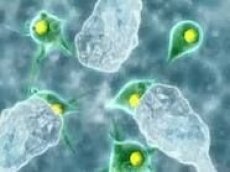Light can be a promising method of cancer treatment
Last reviewed: 23.04.2024

All iLive content is medically reviewed or fact checked to ensure as much factual accuracy as possible.
We have strict sourcing guidelines and only link to reputable media sites, academic research institutions and, whenever possible, medically peer reviewed studies. Note that the numbers in parentheses ([1], [2], etc.) are clickable links to these studies.
If you feel that any of our content is inaccurate, out-of-date, or otherwise questionable, please select it and press Ctrl + Enter.

Light can be an effective and promising method of treating cancer, according to American researchers.
The results of a study by a group of US scientists were published in the journal Nature Medicine, which offered to evaluate the possibilities of creating a new and effective drug. This medicine can be delivered directly to the cancer cell and activated by light, which indicates a targeted and targeted treatment of cancer tumors with minimal harm to the surrounding healthy tissues.
To date, cancer treatment methods can be divided into three groups: radiation exposure, surgical operations and drug treatment. All these treatments have side effects, so scientists do not stop in search of new methods for treating cancer.
Scientists from the Center for the Study of Cancer Diseases (Maryland) in their study used antibodies aimed at protein receptors on the shell of a cancer cell.
To these antibodies, the IR700 substance was attached, starting to work under the influence of light.
To study the effectiveness of this method, researchers implanted cancer cells in the body of mice. After that, the animals were given medicine and left them at the source of infrared radiation.
The results of the experiment showed that the tumor size significantly decreased in comparison with the control group. The official representative of the Foundation for Cancer Disease in Britain, Laura McCallum, stressed that it is too early to speak about the effectiveness of the method in the treatment of cancer in humans, since this study was conducted on animals.

 [
[